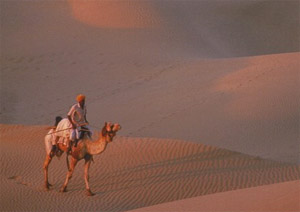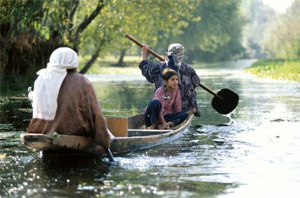Apr 18, 2024
Apr 18, 2024
Leh/Suratgarh
From the scorching desert sands of north India to the cold and icy heights of the Himalayas, it's quite a contrast - particularly if the journey is undertaken in a space of five days.
 I have the Indian Army and the Indian Air Force to thank for both journeys - and while they were work related and involved arduous travel, they also served to bring home the stark variations in two regions that are not too far from each other - and of the pros and cons of development or the lack of it.
I have the Indian Army and the Indian Air Force to thank for both journeys - and while they were work related and involved arduous travel, they also served to bring home the stark variations in two regions that are not too far from each other - and of the pros and cons of development or the lack of it.
In Rajasthan's Thar Desert, the furnace-like heat and the fine sand got into you no matter how well you attempted to cover yourself. Ditto for the mosquitoes that found a way through whatever you tried - repellent creams, nets and what have you.
 Against this, the bracing mountain air of Jammu and Kashmir's Ladakh region came as a soothing salve - and made one realize what a truly pollution-free environment means. Such was the peace and tranquility pervading the land that the chants from a Buddhist monastery miles away carried through crystal clear on a gentle breeze.
Against this, the bracing mountain air of Jammu and Kashmir's Ladakh region came as a soothing salve - and made one realize what a truly pollution-free environment means. Such was the peace and tranquility pervading the land that the chants from a Buddhist monastery miles away carried through crystal clear on a gentle breeze.
To begin at the beginning: the journey began on a Tuesday with the Indian Air Force flying me and a group of 20-odd defence correspondents to Suratgarh in Rajasthan on way to a huge Indian Army war game being played out in the Thar desert.
The hour-long journey was tolerable in a lumbering AN-32 transport whose over-wing twin turboprops created an all-pervasive drone that would put anyone to sleep. Delhi was relatively cool as we took off - but it all came unstuck as the aircraft's doors opened on landing.
"Ha, ha, can't stand this 50 degree heat?" laughed an army officer who greeted us on arrival. "Don't worry, we have lined up a fleet of air-conditioned SUVs for you," he added for good measure.
The land seemed to sizzle as the convoy set off for the 90-minute drive to a place called Pallu that is some 400 km from Rajasthan capital Jaipur and served as the nerve centre of the exercise.
"Hey, this is no way to travel," I thought to myself and down came the windows - to the violent protests of my co-passengers. Not a surprising reaction, considering that it felt like a blowtorch had been pointed in one's face. Reluctantly, the windows came up again.
Not many might realize it, but the desert is a place of great beauty - undulating sand dunes interspersed with brush, camels languidly padding along, curious sheep and cows bemusedly looking on as the convoy passed.
Even so, it was quite evident this was a land of poverty and hard living. Village after village that we passed seemed deserted till we stopped at one - and curious women and children soon appeared. There were very few men and so, where were they?
"The crop's been cut so they've gone off to work in Punjab (as migrant labor on building projects), offered Ram Lakhan, all of 14, who said he didn't have time for school "as I have a lot of work to do in the fields (during the agricultural season) and at home.
"Sir, it's a tough life. There is hardly any water or electricity. There is no work apart from agriculture so the men folk go to other states to find work. We survive on the money they send us," said the lad with a tinge of resignation.
After a quick lunch at a field mess of the kind that only the armed forces can organize in the most trying of conditions, it was off to work.
That's when the sand hit me. The army had very thoughtfully laid out sheet metal paths in the desert but ever so often, one stumbled and landed off the path. My feet sank in to be filled with the sand that had already permeated my clothes - but no one was complaining because, after all, it was all part of a day's work!
And, as the guns boomed and the tanks roared across the desert, they kicked up a maelstrom that no amount of wet towels could keep out.
Then, it was time to climb up a sand dune - all of 20 meters and at a 45-degree incline. Here, sandbags had been laid out to serve as steps but try explaining that to me and the rest of my group. Thus, more sand in the shoes.
Night didn't bring any relief from the heat - but what helped was the sumptuous grill that had been laid out.
The story was repeated on Wednesday - by which time it seemed one had never lived another life; such is the ability of the human body to adapt. But by then, it was also time to return to New Delhi.
The next morning, Thursday, there was a sense of unrealism - of where am I?
Having existed in an intensely military environ for two days, where for much of the time all one saw was soldiers and military fighting vehicles all busily going about their business, the quiet in my gated apartment complex seemed unreal. Or, had the past two days been unreal?
There was little time to ponder this since a call came through that we were off to Ladakh early Friday morning, reporting time being 6.15 in the morning.
To cut a long story short, it was a bracing 11 degrees Celsius in the sun when the giant IL-76 heavy transport aircraft landed at Leh at a height of 9,000 feet.
The landscape was beauteous in its own way - but one wondered about the mountain range that abutted the airfield. It seemed a giant hand had viciously clawed at it - leaving jagged peaks mournfully pointing to the sky - and literally grinding the rocks to dust.
Oh well, here was another kind of desert - but at least it wasn't hot.
Another visage unfolded as we moved out of the airport - a mountain range with what seemed like icing on a cake and behind it, a totally snowbound range.
Here, there was no howling wind of the desert. Such was the peace and quiet that one could literally hear a pin drop!
Mountain life can be extremely harsh but looking at the faces of the locals, their fair and rosy cheeks and smiling faces, one realized that they were, in their own way, content.
A giggly Dolma Tsering, who runs a canteen of sorts at an army IT centre for training locals, tried to put it in perspective.
"Sir, there was very little for me to do in my village so I came to the city to find work. Then I came to this IT centre and realized I could benefit from it only if I had my education. I am now preparing for my class XI exam through (a) correspondence (course)," she offered.
Overhearing this, Tashi, who insisted he was called only that, had his own take on life to offer.
"Sir, all that is fine, but do you realize what has happened with all these people leaving the villages? We were once self-sufficient in fruits and vegetables. Today, with people preferring to move to Leh and other cities like Srinagar to work in offices there are very few farmers left.
"Even most of the shepherds have left. Most of our meat comes from Srinagar. Of course, there are some farmers left and they grow crops like grain. But most of our requirements come from outside," Tashi maintained.
In the part of Rajasthan I visited, there was no development and thus no employment opportunities. The average individual seemed to be disillusioned.
In Leh, the army has directly and indirectly contributed to development. This might have had a negative spin-off - but the average individual seemed to be content.
As I flew out Saturday, I was struck by the thought: does the weather have anything to do with one's attitude to life?
Then, I was struck by another horrendous thought: does a hot India - and the land is predominantly so - have a chance of evolving into a developed country?
Before you dismiss this as hogwash, consider this: In any Indian city, those neighborhoods, be they commercial or residential, that have access to air-conditioning, seem well off. Those that don't seem, well, rundown.
Ditto for railway trains.
I leave it to you to judge this for yourself.
(Vishnu Makhijani is the strategic affairs correspondent of IANS. He can be contacted atvishnu.makhijani@ians.in)
05-May-2007
More by : Vishnu Makhijani